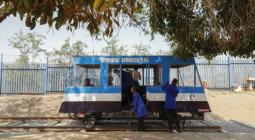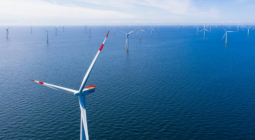As Dele Kuti, global head, energy and infrastructure, Corporate & Investment Banking (CIB) at Standard Bank Group, notes, Africa's energy landscape requires a delicate balance between traditional energy sources and emerging renewables. "Africa needs to be able to develop all forms of energy – in a responsible manner," he says. "That includes oil and gas, as well as renewable energy."
Taking a balanced approach
Kuti says that while Standard Bank is committed to supporting the transition away from carbon-based fuels and reducing the impact of financed carbon emissions from its clients in the non-renewable energy sectors, it also recognises the need for a just energy transition. This transition must be grounded in an understanding of the region's energy mix requirements (a just transition refers to the shift towards a sustainable, low-carbon economy in a way that is fair and inclusive, ensuring that workers, communities, and industries affected by the transition—especially those reliant on traditional sources of energy —are not left behind). For example, although gas still contributes to climate change and air pollution (with gas production and transport releasing methane – a potent greenhouse gas), Standard Bank views gas as an important "transition fuel" on the continent, (which it defines as a lower-carbon content fuel substituted to replace a higher-carbon content sources of energy to be substituted and in a drive to reduce carbon emissions).
The group, which has a footprint across 20 African countries and has been operating for 162 years, has committed to mobilising >R50bn ($24.31bn) of sustainable finance by 2028, including renewable energy financing, while also reducing its involvement in non-renewable projects. In 2024, the bank's portfolio consisted of 71.9% non-renewable energy and 28.1% renewables. By 2030, the bank will limit upstream oil financing to less than 30% of its energy book and to below 3% of Standard Bank Group's total loans and advances. At the same time, the bank is actively increasing its focus on renewables, targeting a renewable-to-non-renewable power generation ratio of at least 3:1.
To support the shift, the bank has committed to mobilise R50bn ($2.7bn) in financing and provide R15bn in underwriting for renewable energy projects. It will also reduce exposure to thermal coal, both by limiting it as a share of total group loans and advances and by scaling downing financing to existing power sector clients whose energy generation is predominantly coal-based.
"Our purpose as Standard Bank is to drive the growth of the continent," says Kuti. "We say: Africa is our home; we drive her growth."
Standard Bank CIB hosted its first African Markets Conference in South Africa in late March 2025, which brought together global and African investors, risk leaders, policymakers, and regulators to help mobilise capital flows to meet Africa's structural needs, including energy stability and transition.
Kuti says the key to overcoming Africa's energy challenges is creating an enabling environment to support investor confidence. He says South Africa's Renewable Independent Power Producers Procurement Programme (REIPPPP) is a good example of an initiative that enables cross-sector partnership.
The country's electricity supply is dominated by coal-fired power generation. In seeking to address its energy shortage and improve renewable energy uptake, South Africa aims to grow the independent power producer (IPP) market through the REIPPPP. Kuti says the initiative has delivered impressive results and suggests that identifying successful models and looking for opportunities to scale or replicate these elsewhere on the continent could help to address Africa's energy needs more quickly and efficiently.
Rentia van Tonder, head of power, client coverage, Standard Bank Group, says that power projects in Africa often face currency mismatch risks because they tend to be funded in hard currency (usually USD) but generate revenue in local currency, through electricity tariffs charged to consumers. Standard Bank is able to use its global markets platform to develop currency mitigation solutions for long-term finance. Van Tonder says there's also a need for patient capital and innovative funding solutions, such as blended finance offerings in partnership with development finance institutions (DFIs). " Partnering with clients early on assist our ability to navigate through some of these complexities," she says.
She says there's good momentum on the continent around the just energy transition, with commitments from various governments to fast-track investment into renewable energy. "It's worth highlighting that it's not all about renewables. We believe that a balanced approach is needed," she says. "Countries should focus on flexibility, rather than just going for one specific technology, which can be risky."
She says Standard Bank CIB views its key markets in the short- to medium-term being mainly southern and central Africa, including the likes of Namibia, Zambia, Mozambique, and Botswana, which have very clear targets around sustainable investment and "green" projects. She says that with the development of open market power systems, more players — including private companies — can now enter the energy market, opening the way for commercial and industrial energy solutions (such as solar installations for factories, warehouses, or business parks), as well as mini grids (small-scale, localised power networks that can operate independently or alongside the main power grid), which can improve power supply to rural or underserved areas.
"We believe the future is not about each country trying to solution for itself but rather creating regional power pools – interconnectivity between the East Africa power pool and South Africa power pool, with clear rules of engagement, policies around the trading of power. As a bank, we believe that our footprint will help us to enhance and fast-track some of these opportunities," says Van Tonder.
Cover photo: By BBC News



